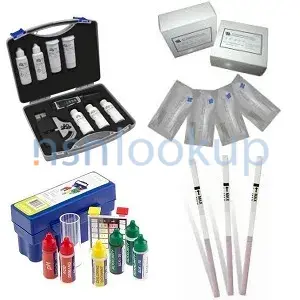And Lithium Carbon Dioxide Chloride Potassium Sodium Phosphorus Calcium Creatinine Urea Nitrogen Glucose Reference Standard Set
Item Name Code (INC) 48724
 |
 Additional Information for And Lithium Carbon Dioxide Chloride Potassium Sodium Phosphorus Calcium Creatinine Urea Nitrogen Glucose Reference Standard Set
Additional Information for And Lithium Carbon Dioxide Chloride Potassium Sodium Phosphorus Calcium Creatinine Urea Nitrogen Glucose Reference Standard Set
The "And Lithium Carbon Dioxide Chloride Potassium Sodium Phosphorus Calcium Creatinine Urea Nitrogen Glucose Reference Standard Set" is a collection of reference standards used in in vitro diagnostic testing. These substances are commonly used in medical, dental, and veterinary settings for various diagnostic purposes.
Here is a breakdown of each component in the reference standard set:
1. Lithium: This is a chemical element used in the measurement of lithium levels in the body. It is often used in the diagnosis and monitoring of certain medical conditions.
2. Carbon Dioxide: This is a gas that is measured in blood gas analysis to assess the acid-base balance and respiratory function of a patient.
3. Chloride: Chloride is an electrolyte that is measured in blood tests to evaluate the body's fluid and electrolyte balance.
4. Potassium: Potassium is an essential mineral that is measured in blood tests to assess kidney function, electrolyte balance, and overall health.
5. Sodium: Sodium is another electrolyte that is measured in blood tests to evaluate fluid balance, kidney function, and overall health.
6. Phosphorus: Phosphorus is a mineral that is measured in blood tests to assess bone health, kidney function, and overall metabolism.
7. Calcium: Calcium is an essential mineral that is measured in blood tests to evaluate bone health, nerve function, muscle function, and overall health.
8. Creatinine: Creatinine is a waste product produced by muscles that is measured in blood tests to assess kidney function and overall health.
9. Urea Nitrogen: Urea nitrogen is a waste product produced by the liver that is measured in blood tests to evaluate kidney function and overall health.
10. Glucose: Glucose is a sugar that is measured in blood tests to assess blood sugar levels and evaluate diabetes management.
The reference standard set is used as a quality control tool to ensure accurate and reliable results in diagnostic testing. It provides a standardized set of substances with known concentrations that can be used to calibrate and validate testing equipment and procedures.
 Related Item Names for INC 48724 And Lithium Carbon Dioxide Chloride Potassium Sodium Phosphorus Calcium Creatinine Urea Nitrogen Glucose Reference Standard Set
Related Item Names for INC 48724 And Lithium Carbon Dioxide Chloride Potassium Sodium Phosphorus Calcium Creatinine Urea Nitrogen Glucose Reference Standard Set
 NATO Stock Numbers with Item Name 48724 And Lithium Carbon Dioxide Chloride Potassium Sodium Phosphorus Calcium Creatinine Urea Nitrogen Glucose Reference Standard Set Page 1 of 1
NATO Stock Numbers with Item Name 48724 And Lithium Carbon Dioxide Chloride Potassium Sodium Phosphorus Calcium Creatinine Urea Nitrogen Glucose Reference Standard Set Page 1 of 1
- 013605723
- 88234
- RNCC: 3 | RNVC: 2
- B5628-100
- RNCC: 3 | RNVC: 2
- ALIGN
- RNCC: 5 | RNVC: 1
- A92D435
- RNCC: 5 | RNVC: 1